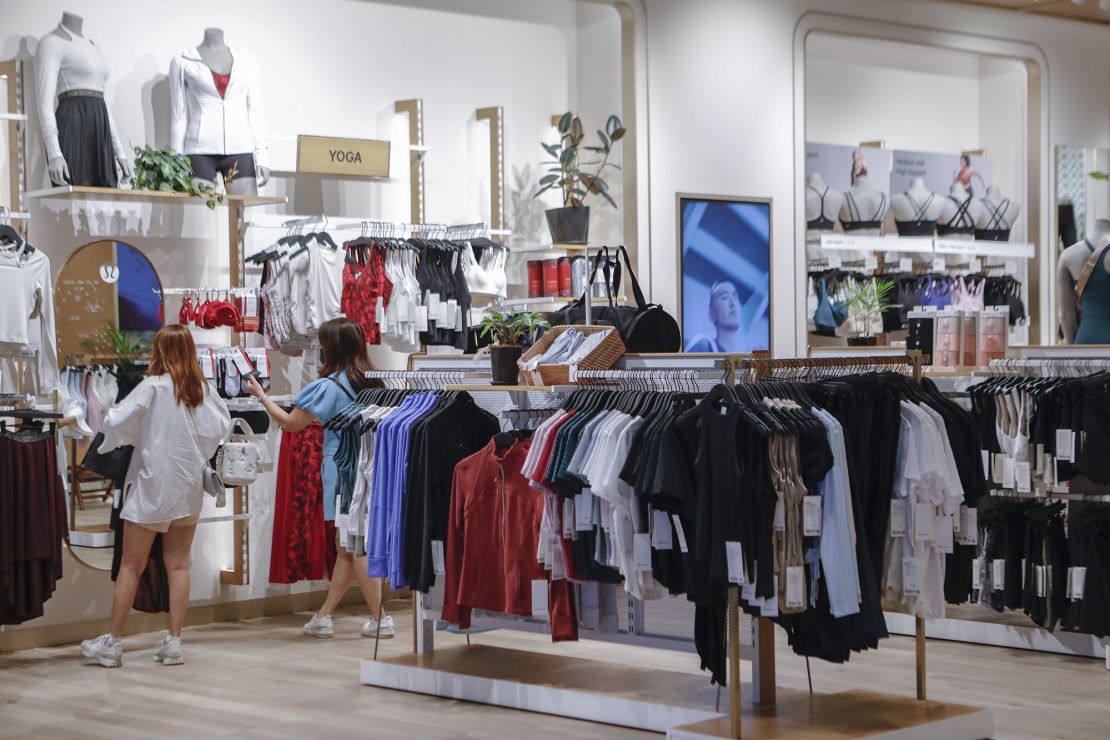New York
CNN
—
Lululemon, maker of the pricey yogawear sported by seemingly everyone from Pilates moms to college students to preteens in the US, is at a crossroads.
For over a decade, the company has fought off competitors like Athleta and Nike to dominate the luxury athleisure market, managing to grow despite the lightning rod of controversies that followed its founder. Its soft, colorful, $98 leggings and viral beltbags have attracted an even younger demographic, a huge plus for any retailer. But, while the skin-tight look shot Lululemon to fame, it now must navigate a new, baggy pant-loving Gen Z demographic and the radical reshuffling of its own executive team.
Lulu stock is down almost 40% year to date but rose more than 10% after hours on Wednesday, after slightly topping analyst revenue expectations in its first quarter 2024 earnings.
Macroeconomic headwinds are hitting many peer retailers, of course. But Lulu is also coping with the addition of trendy, celebrity and influencer-backed competitors like Alo, which is known for its monochromatic, chic sets, and Vuori, which carved out a space for itself in men’s athleticwear. And the company blamed its slower North American sales on its own actions: It just didn’t have enough sizes and colors in stock for its youngest customers.
Lulu recently announced that its chief product officer – considered by Wall Street a key engine of its success – was leaving just ahead of its first quarter earnings release Wednesday.
As part of that release, Lululemon said it was raising its stock repurchase program by $1 billion, which could help calm down investors who are worried abut slowed growth.
The company also maintained a brighter outlook for the year, saying it expects its net revenue to be between $10.7 billion and $10.8 billion.
Sun Choe, who had been Lululemon’s creative mastermind, recently resigned to join Vans as its global brand president.
The departure of the company’s chief product officer adds to a “wall of worry” Raymond James analysts said.
Choe joined Lululemon more than seven years ago and became chief product officer in 2018, according to her LinkedIn. Raymond James analysts credit Lululemon’s success with strong products and marketing to Choe’s role at the company.
Shares fell as much as 7% on May 22 upon news of her departure.
She left big shoes to fill, Wedbush analyst Tom Nikic told CNN. Under Choe, there was “constant innovation and newness, whether it’s new fabrics or getting into new product categories.”
There’s a reason Wall Street responded so negatively to Choe’s departure.
“I think that there’s a lot of people out there who believe that she was the person behind the scenes and was the most instrumental to Lululemon’s success,” Nikic said.
The fashion the company was known for has already been on the way out, Jefferies analysts warned.
They “believe the company’s product assortment is falling flat.”
Lululemon is getting walled in by two very different types of competitors. On one end is those rapidly expanding luxury yogawear brands Alo and Vuori, who have been opening stores near existing Lululemon locations. And then there’s the culture of dupes, which claim leggings just as soft as Lulu’s can be purchased for a fraction of the price.
Lulu has been “hyper aware” of dupe culture, Nikki Neuburger, then its Chief Brand Officer, previously said in an interview with CNN Business. So much so that the brand hosted a dupe swap at the Century City Mall in Los Angeles. Bring in a knock-off pair, Lulu said, and they’ll swap it out for the black Align High Rise Pant 25’.
That wasn’t enough to quell knock-off popularity. As Americans cut back spending due to inflation and rising prices, many view a $90 pair of leggings as an unnecessary expense.
And for those who can still shell out the money, Lululemon faces steep competition. Alo shot to popularity after celebrities from Hailey Bieber to Martha Stewart were photographed in the trendy brand. Vuori has a $400 million investment by Softbank and said it had bullish plans to open more than 100 stores in the US in the next five years.
Lululemon’s demographic has shifted – originally marketed toward suburban women in their 30s and 40s, its stores are increasingly filled with younger, close to preteen-aged shoppers.
In its Q4 earnings call in March, Lululemon said it had seen strong sales of its smaller sizes and colorful offerings.
However, Lululemon wasn’t stocked enough in these smaller sizes, which could have led these younger shoppers to competitors, Nikic said.
But these are quick fixable problems, Nikic said. CEO Calvin McDonald made clear the company was still focused on pursuing its new core customer in its last earnings call.

(Lululemon has not responded to request for comment for this story in advance of their Wednesday earnings.)
Lululemon also has potential for growth in its men’s sector and international business.
Unlike athletic brands like Nike that have a huge international footprint, Lululemon’s international business represented only 21% of its business at the end of 2023. The company said in the fourth quarter that its mainland China revenue increased 78%, compared to North America’s revenue increase of 9%.
“I certainly would not say that hope is lost with this company. This is a company that has a long track record of success,” Nikic said.

